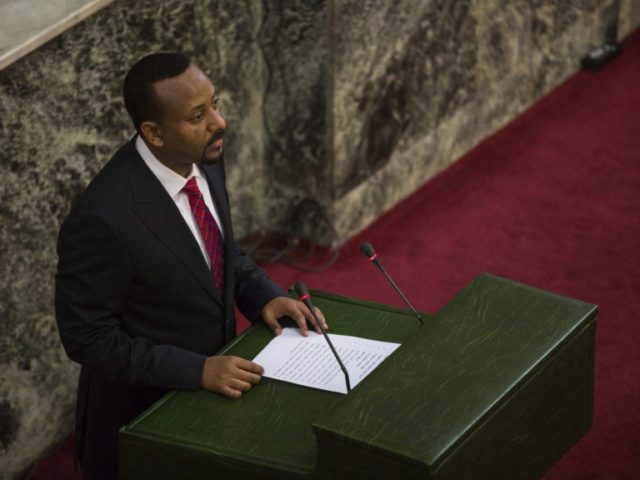This morning’s key headlines from GenerationalDynamics.com
- Ethiopia’s new PM lifts state of emergency two months early
- In a surprise, Ethiopia accepts peace deal with Eritrea
Ethiopia’s new PM lifts state of emergency two months early

Ethiopia’s Prime Minister Abiy Ahmedat (Getty)
Ethiopia on Tuesday lifted a state of emergency two months early. The state of emergency had been imposed in February, in response to riots and demonstrations by millions of people, mostly in Ethiopia’s Oromia region. The state of emergency forbids unauthorized demonstrations or the distribution of politically sensitive material, and permits politically motivated arrests without charge.
The government is largely controlled by the ethnic Tigrays, who are a market and government dominant minority, comprising only 6 percent of the population. They are extremely authoritarian and have succeeded in marginalizing the other ethnic groups, and are said to have informants in villages throughout the country. They have succeeded in marginalizing the Oromo ethnic group, which comprises 34 percent of Ethiopia’s population, and the Amhara ethnic group, which comprises another 27 percent. Since late 2015, massive anti-government protests in Ethiopia’s Oromia region, later spreading to the neighboring Amhara region, left hundreds dead and resulted in tens of thousands of arrests.
In a major break with tradition, the Tigrays in April of this year permitted the selection of Abiy Ahmedat, 42, an Oromo leader, to be prime minister and leader of the governing coalition, in the hope of ending the chaos and bloodshed.
The early termination of the state of emergency is thought to be a positive sign that the situation is stabilizing, and that the reforms being implemented by Abiy are working. It is also being touted as an opportunity for investors to begin once again exploring investment opportunities in Ethiopia.
Since taking office, Abiy has visited major cities across Ethiopia and appealed to anti-government protesters to give his administration time to work. He has also continued a campaign of releasing jailed dissidents. Officials hope that his reform policies will end the protests permanently.
From the point of view of Generational Dynamics, it is almost impossible that the mass protests will be permanently ended. Ethiopia is in a generational Awakening era, like America and Europe in the 1960s, or like Iran today, when mass protests are a frequent feature. Mass protests can end temporarily, or be suppressed by violence from the security forces, but they return.
Furthermore, whether protests by the Oromos may have temporarily ended, there are reports that violent attacks are still continuing against the ethnic Ahmaras. The Nation (Kenya) and CNBC and Addis (Ababa) Standard and TRT World (Turkey)
In a surprise, Ethiopia accepts peace deal with Eritrea
Just hours after Ethiopia lifted the state of emergency on Tuesday, the government took a major surprise step by announcing that it would fully accept the terms of a peace agreement with Eritrea.
In 1998, a border war broke out between Eritrea and Ethiopia. This was a non-crisis war, with a quality very similar to World War I, where trenches were dug, mines were laid, and bodies of dead soldiers were strewn about. Of the 400,000 men who fought on both sides, 50,000 soldiers died.
A peace deal in 2000 ended the two-year border war, but it was not fully implemented. Tuesday’s announcement says that Ethiopia, for the first time, accepts the terms of the 2002 border commission report. The report awarded disputed territories, including the town of Badme, to Eritrea.
The border war had begun in the May 6, 1998, in a battle for control of the border town of Badme. This town is described as nothing but a “humble, dusty market town,” with no oil, no diamonds, and no apparent value, exception emotional. Both Eritrea and Ethiopia wanted the town, and at the time the resulting war was described as “two bald men fighting over a comb.”
By accepting the agreement, Ethiopia will have to withdraw its occupying forces from all territories awarded to Eritrea, including the flashpoint town, Badme. Ethiopia also called on Eritrea to reciprocate the decision and work toward bringing a lasting peace between the people of the two countries.
As I described in my 2016 Generational history of Ethiopia and Eritrea, Ethiopia is a Christian country, and Eritrea is a Muslim country. The two countries were Italian colonies in the 1800s, and again in the late 1930s as “Italian East Africa.” Eritrea declared independence from Ethiopia in 1993, leading to the 1998-2000 border war. It’s very unlikely that there will be lasting peace. Addis (Ababa) Standard and BBC and Al-Jazeera and BBC
Related Articles:
- Ethiopia chooses an Oromo leader, as Kenya has farcical confrontation with the courts (30-Mar-2018)
- Thousands of Ethiopian Oromos flee into Kenya, threatening regional stability (15-Mar-2018)
- Ethiopia declares state of emergency after shock resignation of prime minister (17-Feb-2018)
- Ethiopia declares extraordinary six-month state of emergency (10-Oct-2016)
- Heavy fighting along Eritrea-Ethiopia border raises fears of war (14-Jun-2016)
KEYS: Generational Dynamics, Ethiopia, Oromia, Tigrays, Amharas, Abiy Ahmedat, Eritrea, Badme, Italy, Italian East Africa
Permanent web link to this article
Receive daily World View columns by e-mail

COMMENTS
Please let us know if you're having issues with commenting.